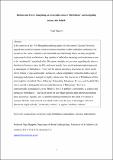Files in this item
Britain and Brexit : imagining an essentialist sense of “Britishness” and navigating amongst “the British”
Item metadata
| dc.contributor.author | Rapport, Nigel | |
| dc.date.accessioned | 2022-01-17T00:38:12Z | |
| dc.date.available | 2022-01-17T00:38:12Z | |
| dc.date.issued | 2020-07-17 | |
| dc.identifier | 269363867 | |
| dc.identifier | 56fd8b50-0067-461a-88d0-ea5b3ca1c205 | |
| dc.identifier | 85088031370 | |
| dc.identifier | 000550005000003 | |
| dc.identifier.citation | Rapport , N 2020 , ' Britain and Brexit : imagining an essentialist sense of “Britishness” and navigating amongst “the British” ' , Anthropology Southern Africa , vol. 43 , no. 2 , pp. 94-106 . https://doi.org/10.1080/23323256.2020.1740604 | en |
| dc.identifier.issn | 2332-3256 | |
| dc.identifier.other | ORCID: /0000-0003-2803-0212/work/90112036 | |
| dc.identifier.uri | https://hdl.handle.net/10023/24668 | |
| dc.description.abstract | In his analysis of the 1956 Hungarian uprising against Soviet control, Georges Devereux argued that social movements exist not because members exhibit attitudinal uniformity but because in the “same” collective act individuals serendipitously find a socially acceptable expression for their worldviews. Any number of individual meanings and motivations come to be “accidentally” actualised alike. Devereux’s insights are pertinent regarding the elective decision in Britain to leave the EU, and more broadly for a social-anthropological approach to stereotypes of “Britishness.” There are certain customary discourses by which social life in Britain is “ego-syntonically” conducted, whose competency represents both a sign of belonging and means to navigate everyday interactions. Six discourses of Britishness of this kind might be identified: class; ethnicity; nationality; islandness; privacy; and football. But one is careful to distinguish between such discourses of Britishness — how it is stereotypically, formulaically, to be “British”; how it is publicly, customarily, to express and take part in “Britishness” — and the diversity of individual identities that inhabit and animate those discourses. Equally, one is careful to distinguish between the kinds of violence or violation that the expression of individual worldviews by way of stereotypic collective discourses might embody: “democratic violence” as against “nihilistic violence.” | |
| dc.format.extent | 13 | |
| dc.format.extent | 366268 | |
| dc.language.iso | eng | |
| dc.relation.ispartof | Anthropology Southern Africa | en |
| dc.subject | Britishness | en |
| dc.subject | Code | en |
| dc.subject | Essentialism | en |
| dc.subject | Individuality | en |
| dc.subject | Nationalism | en |
| dc.subject | Stereotype | en |
| dc.subject | Violence | en |
| dc.subject | GN Anthropology | en |
| dc.subject | Cultural Studies | en |
| dc.subject | Anthropology | en |
| dc.subject | T-NDAS | en |
| dc.subject | SDG 16 - Peace, Justice and Strong Institutions | en |
| dc.subject.lcc | GN | en |
| dc.title | Britain and Brexit : imagining an essentialist sense of “Britishness” and navigating amongst “the British” | en |
| dc.type | Journal article | en |
| dc.contributor.institution | University of St Andrews. Social Anthropology | en |
| dc.identifier.doi | 10.1080/23323256.2020.1740604 | |
| dc.description.status | Peer reviewed | en |
| dc.date.embargoedUntil | 2022-01-17 |
This item appears in the following Collection(s)
Items in the St Andrews Research Repository are protected by copyright, with all rights reserved, unless otherwise indicated.

